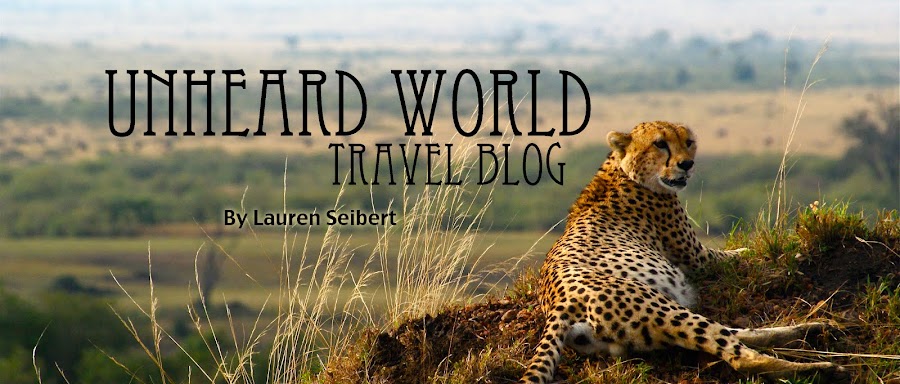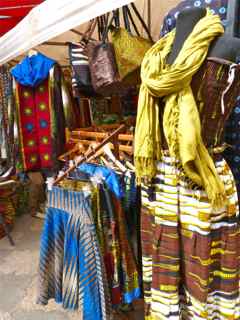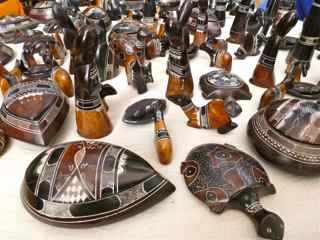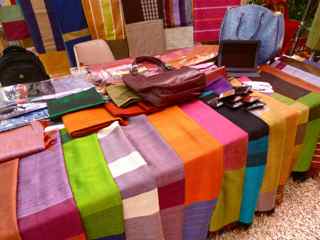When I woke up, groggy because I hadn’t been able to fall asleep until around 3 or 4 AM, I reached for my purse and frowned when my hand touched nothing. Did I knock it on the floor? I sat up and scanned around me, confused when the bag was nowhere in sight. When I stood up to check the floor, I suddenly noticed the screen door standing wide open. My heart started pounding. Once I realized that the bag was genuinely gone - containing a big chunk of grant money I had just withdrawn for a project, my phone, camera, passport, checkbook, keys, bank cards, notebooks, and God knows what else - panic rose up, choking me.
I raced out of my room and told my host family, then ran around back, where it was confirmed: a big tire was propped up against the wall. That’s when the tears flooded out.
That day I was a mess, crying and furious and scared. Not just at the loss of all that money and all those things, but also because my little sanctuary in this tough country wasn’t a sanctuary any more. It wasn’t safe. Here was a person - or people - who had specifically sought me out and targeted me for a crime. Despite all that I had been doing to help the community, all they saw was my stupid white skin, like a giant bull’s eye.
My first coherent thought was: screw this. I’ve gone through enough, and I can’t take any more. I’m done with Senegal. I would pack my bags and take off. I had to get to the Peace Corps house to get help, because I didn’t even have a phone any more.
“I can’t stay here,” I told my host mom, throwing things into my backpack and still crying. “I’m leaving. Every day I have to deal with people mocking me, pointing at the ‘toubab’ and bothering me, and now this? Why should I try to live here and help people who can treat me like this?”
“Aïssatou, wait… these people, they know nothing,” Mariama (host mom) said, upset. “It’s dangerous here. You didn’t close and lock the back door? We told you to keep it closed, we told you to lock it…”
I love Mariama, but I didn’t want to listen to that. Nights could be sweltering in my hut. All I wanted was a little breeze. My back door opened into an enclosed area with stone walls higher than our heads. With all that, they expected me to close the metal door and bake myself each night in my little oven?
Seeing that slice through the screen door where the intruder cut through to open the latch made me feel sick. I still think about the fact that there was some guy creeping in my room as I was sleeping, reaching over to grab my bag from next to me. What would have happened if I had woken up? It terrifies me.
I hate being afraid. I’m proud of being that girl who goes off to Africa and travels solo to explore new places, cultures, and people. I like being independent and I like that I can do just fine on my own. Usually.
After the burglary, I spent the day alternately repeating my story (to family, police, Peace Corps, friends, etc.), crying, and filling out paperwork. It felt like a pile of stones was sitting on my chest.
But listening to my family asking if I wanted to come home, something inside me cringed. I am just starting to really accomplish things here… so many projects in the works. The Kolda agricultural Fair, my English clubs, youth camp, my work with talibé boys, my upcoming moringa causeries with women’s groups. I’m not a quitter.
So a few days have passed, and I’m still here. I’ve been running around visiting the bank and the police and chasing dead ends. I’ve told and retold the story, and each time the heaviness of it has eased up bit by bit.
Finally, a day came when I felt oddly energized and at peace. It was completely unexpected… but wonderful. I couldn’t explain why I felt that way, but happiness was making a reappearance. The sky seemed clearer, the air was crisper on my skin, and smiles kept surfacing.
It was strange feeling so happy after the incident, but I guess the break-in has made me appreciate everything I still have left, including good friends and my own life - thankfully the guy never touched me! And no one I love was hurt. What are things in comparison to that? Not to mention the guy managed not to steal the two electronics most important to me: my computer and iPod, which were both lying next to me on the bed. I can’t explain that, but I feel blessed. (Although not having my little camera still sucks. Such is life.)
Biking around Kolda the other day, for the first time, I felt absolutely nothing and no irritation when kids yelled “toubahaako” at me (a cheeky little insult / play on the word “toubab”). Usually it grates on me, but this time it all rolled off my back like raindrops on a raincoat. I blew them a kiss.
Before the Christmas holidays, everything had been great for me in Senegal. But after returning from an amazing vacation in Australia, I found myself feeling a bit down at the re-immersion into the grit and hardship of Peace Corps life. I was noticing all the dirt, the noise, the smells; I was missing my invisibility and independence; I was missing art and culture and food variety – and just variety in general. I was finding the Senegalese men abrasive. I tried to orient myself and keep optimistic, but my heart wasn’t aligning with my head.
Then the burglary happened. And now all of those negative thoughts have basically… dissipated. I’m not looking at the dirt, but focusing on the sunsets, the brilliant African fabrics, the trees, and the big smiles of my friends. I’m laughing at the funny aspects of life here (telling any Diallo I meet that he’s a bean-eater, goats balancing on the weirdest ledges imaginable, sheep getting in the way everywhere) and the random adventures (meeting a magic man, seeing a radio technician at work, watching workers use a rope and pulley to build an elaborate mosque tower by hand). Community members and Senegalese friends have been so supportive. A beautiful new baby just arrived in my host family. Life is never boring, I can say that.
As crazy as it may sound, I feel like the break-in was the storm that cleared out my murky skies, leaving me with only blue.
 |
| Host family's new baby boy. |



















